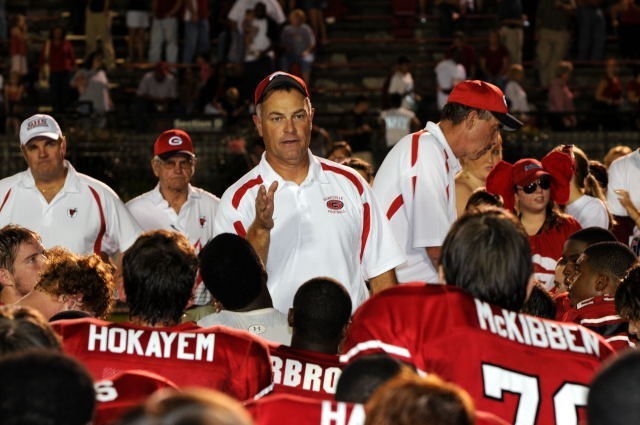GAINESVILLE — Bruce Miller paused — for all of a split-second — when asked about his legacy with Gainesville football.
“It’s whatever folks want it to be,” Miller said. “I’m just an old country boy that happened to fall in love with football. And Gainesville’s been a special place for me.
“When I first got here I thought they’d run me off in a year or two.”
Instead, the “old country boy” walked away on his own terms on Tuesday night, taking with him 16 years of glorious memories, including the program’s first state championship and eight region crowns, having captivated a city system like only one man prior.
And they named a field after him.
Bobby Gruhn was Red Elephant football when he retired following the 1992 campaign, having built a 254-104-5 record that included 16 region championships and four state runner-up finishes over 30 years.
That’s a Hall of Fame body of work, and it cast a huge shadow across northeast Georgia where the Red Elephants were — especially from 1966-86 — often the gold standard. But it also set an incredibly high bar that proved frustratingly out of reach for the program, at least until Miller arrived in 2002.
Certainly alum Steve Wilson lifted some heavy loads in getting Gainesville back into the state playoffs (2000-01) after reaching the postseason just once in the first seven years following Gruhn’s retirement. And Wilson’s work in just two campaigns before returning to the collegiate ranks from whence he came helped set the stage for Miller’s success.
But there’s no doubt that Miller brought something extraordinary and unique to Gainesville, something that had not been seen since those glory days of there Gruhn era — regardless of what the self-deprecating coach says. (“I went to Mars Hill College, which is now Mars Hill University, and I had a choice whether to become a minister or a football coach, and God told me this was the path I should choose -- which is good because I probably wouldn't have been a very good minister,” Miller joked.)
He did it in his very first campaign in leading the Red Elephants into the state semifinals for the first time since 1985. And he kept on doing it, finishing his 16 seasons with Gainesville with a 157-46 record and 16 straight state playoff appearances.
In 2012 Miller also led his team up the podium steps of the Georgia Dome as state champions, banishing decades worth of demons for a Red Elephants program that came so close so to the ultimate prize so many times, only to see it cruelly snatched away.
Talk to him about that night now — or even on that night in Atlanta — and you would have a hard time believing he was more than another thrilled spectator. You also begin to sense just why he has been so successful.
“That state championship was not about me,” Miller said on Tuesday. “A lot of people did a lot of incredible things that season, including our players and coaching staff.”
Certainly there was one Deshaun Watson, who in turn took the collegiate gridiron by storm and looks set to do so at the professional level, on that team. But Watson and his teammates were also beneficiaries of a focused and innovative coaching staff that made the most of prodigious talents at the right time.
Gainesville fans of the right vintage will remember that Miller’s early Red Elephant squads employed the long-trusted wing-T system. Those same fans may also remember that Miller scrapped that attack in the mid-2000s and opted for the more pass-oriented spread that made the most of dual-threat quarterbacks like Watson and Blake Sims, whose abilities terrorized opposing defenses and helped the Red Elephants to a state title (2012), a runner-up finish (2009) and two other semifinal appearances.
“He’s definitely known in the football world as an offensive guru,” Red Elephants athletic director Adam Lindsey said. “He loves the game, and spends time studying the game. And to change philosophies like that is not easy. But he had that ability to dive in and make it work.”
Miller also has the ability to connect with people, and his connection to his players is perhaps the No. 1 aspect that former players and fellow coaches point to when asked about Miller’s legacy.
“Everybody says they care about the kids but Bruce lived it, and that's a big part of why he was so successful,” Lindsey said.
A love for the game, a talent for diagnosing it and an ability to connect with players and co-workers — mix in the type of athletes Gainesville football often has at its disposal, and it’s no wonder that Miller enjoyed so much success on the Bobby Gruhn Field turf. And it is a venue that has seen some all-time showdowns during Miller’s reign — like the time Gainesville defeated a Cam Newton-led Westlake in the second round of the 2005 state playoffs. Or when the Red Elephants halted then-No. 1 Sandy Creek’s 41-game win streak in the 2011 state quarterfinals, 35-21.
And then of course there was that epic 2009 state semifinal slugfest with Flowery Branch that the Red Elephants edged 29-21.
“I’ll never forget those games and those moments,” Miller said. “It’s been a pleasure.”
Though there’s little doubt that Miller’s greatest enjoyment has come in the shape of the relationships built with players and co-workers.
“You get into this job to help people," Miller said. "I love all my players, and I love Gainesville. I wanted to be a coach ever since I was 6 years old.”
It is something made obvious to anyone involved with Miller through the years and something that brought the Red Elephants back to lofty heights through much of the last 16 years. How is that for a legacy?









